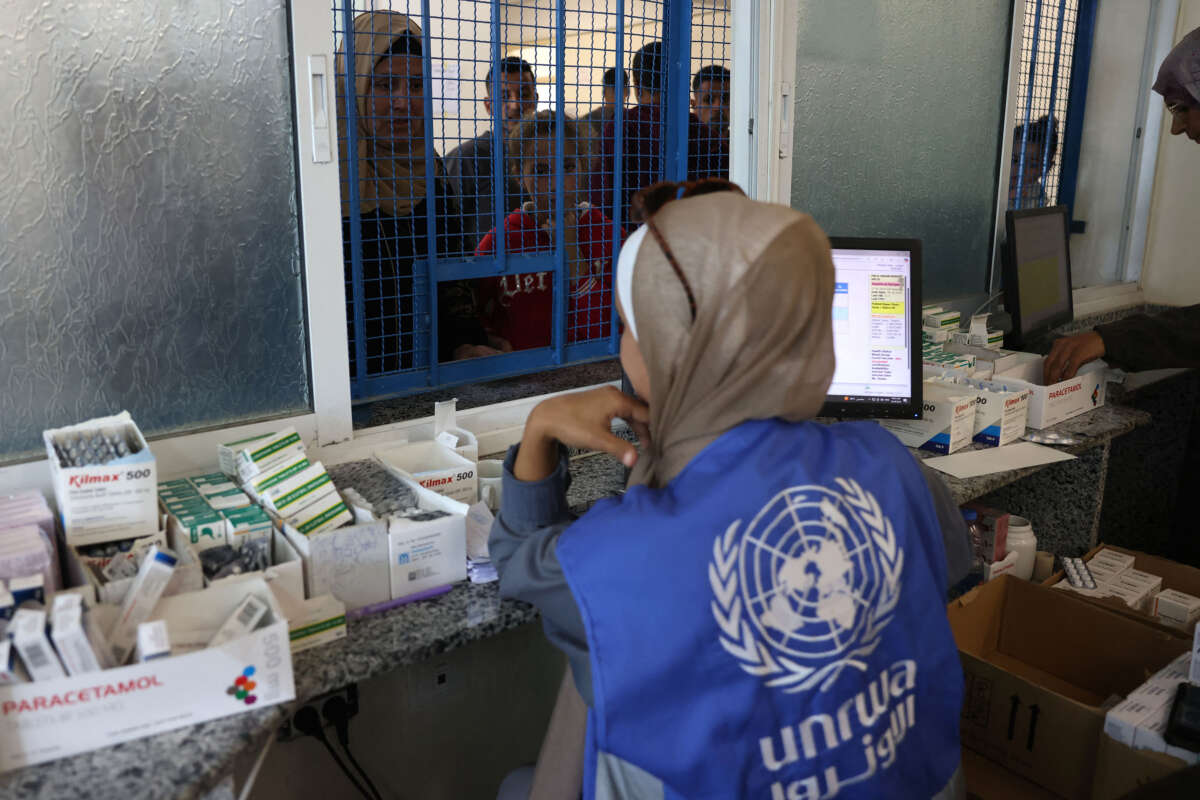Honest, paywall-free news is rare. Please support our boldly independent journalism with a donation of any size.
Facing an increasingly dire food catastrophe under Israel’s famine campaign, the head of Gaza’s main humanitarian aid group says that its workers have resorted to eating animal feed to survive.
In an interview with CNN’s Christiane Amanpour on Thursday, UN Relief and Works Agency for Palestine Refugees (UNRWA) Commissioner-General Phillippe Lazzarini said that the agency’s workers’ stories are “heartbreaking,” as Israel has maintained its near-total humanitarian blockade on the region.
“Stories are absolutely harrowing,” said Lazzarini, detailing how a staff member recently went to Gaza and heard from 2,000 UNRWA staff there. “For example, staff members saying that, ‘I lost 30 kilos, we are hungry, and we are just eating animal fodder to keep us alive.’”
The fact that even UNRWA staff, who help distribute and coordinate humanitarian aid as the main aid group operating in Gaza, can’t access real food is a show of the brutality of Israel’s blockade, the UNRWA head said.
“Hunger is a real reality, it is deepening in Gaza. You know, Christiane, in September we couldn’t reach 1 million people; 1.4 million people in October; 1.7 million people in November. Hunger is deepening,” he said.
Indeed, the UN has recorded a drastic decrease in aid entering Gaza in recent months, leading international food authorities to conclude in November that famine is about to occur, if not already present, in north Gaza, where Israel has blocked nearly all aid from entering since last October. The situation is also dire in central and southern Gaza, where food insecurity officials have also said famine is imminent.
At the same time, reports have found that Israel is empowering gangs to loot what little aid Israeli forces do allow in. An internal UN memo reported by The Washington Post last month found that such gangs “may be benefiting from a passive if not active benevolence” from Israeli soldiers. These gangs operate in areas under Israel’s military control, on or nearby main aid routes, meaning that they are hijacking or attacking trucks while under the military’s watchful eye.
Further compounding the looting is Israel’s practice of killing Palestinians who protect the aid convoys. According to Gaza officials, Israel has killed at least 700 police who were tasked with protecting aid trucks since October 2023. Just on Thursday, Israeli forces killed 15 Palestinians who were guarding humanitarian convoys, Gaza medics said.
Israeli forces claimed that the people they killed were members of Hamas who were there to loot the convoy. But there is no evidence to support Israel’s claims, and in fact, Hamas forces have themselves been killing members of the looting gangs, Hamas has said and the UN has found.
Lazzarini said that the gangs have been able to operate due to the “lawlessness” in Gaza, caused by Israel’s genocide. He added that, just this week, Israeli forces killed and injured dozens of people in food lines, in a “repeat of the flour massacre” in February, when Israeli forces killed over 100 Palestinians in a food line in Gaza City.
International officials and experts have repeatedly warned that Israel is using starvation as a weapon of war, including major humanitarian rights group Amnesty International, which concluded in a watershed report last week that Israel is indeed committing genocide in Gaza.
“By continuing to starve Palestinians in Gaza, Israel does deepen resentment around the world, as well as its responsibility, and that of its accomplices, for genocide,” said UN Special Rapporteur for the occupied Palestinian territories Francesca Albanese, in response to Lazzarini warning that starvation will only foster even more resentment toward Israel among Palestinians.
“However, the global rise of extremism, including in liberal democracies, demonstrates that one does not need to be starved to become extremist,” Albanese went on.
Israeli forces also killed at least 40 people in a strike on Nuseirat refugee camp in central Gaza on Thursday, targeting a residential block with most of the victims hailing from the same family.
“We’ve seen absolutely horrific images from the scene. There are parents looking for their children, children covered in dust and blood, looking for their parents,” said UNRWA Senior Emergency Officer Louise Wateridge of the strike.
A terrifying moment. We appeal for your support.
In the last weeks, we have witnessed an authoritarian assault on communities in Minnesota and across the nation.
The need for truthful, grassroots reporting is urgent at this cataclysmic historical moment. Yet, Trump-aligned billionaires and other allies have taken over many legacy media outlets — the culmination of a decades-long campaign to place control of the narrative into the hands of the political right.
We refuse to let Trump’s blatant propaganda machine go unchecked. Untethered to corporate ownership or advertisers, Truthout remains fearless in our reporting and our determination to use journalism as a tool for justice.
But we need your help just to fund our basic expenses. Over 80 percent of Truthout’s funding comes from small individual donations from our community of readers, and over a third of our total budget is supported by recurring monthly donors.
Truthout has launched a fundraiser to add 432 new monthly donors in the next 7 days. Whether you can make a small monthly donation or a larger one-time gift, Truthout only works with your support.
